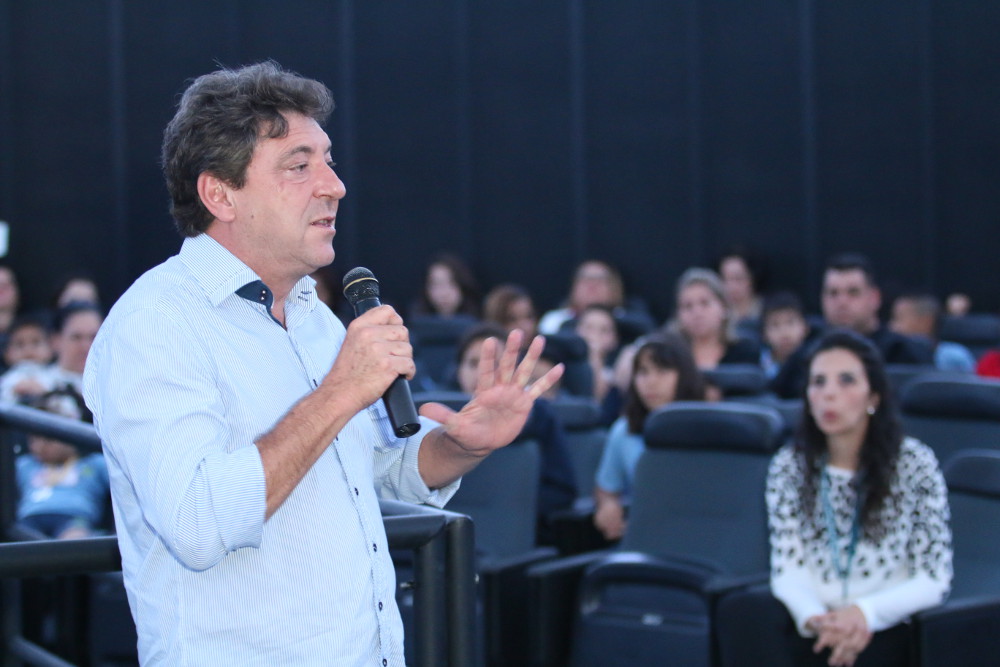
Interview with Mr. Carlos Grana, Mayor of Santo André
Interviewed by the Association, the Mayor of Santo André, Mr. Carlos Grana stresses that by joining forces around the shared ideal of the Educating City, we are taking major steps towards a more democratic society. Read the whole interview here.
What does the membership of the IAEC provide to Santo André and what can your city contribute to the Association?
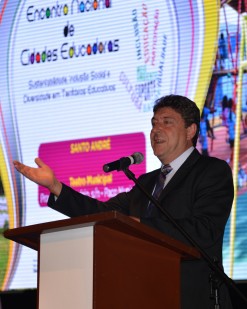 The world is facing a series of new problems that require new solutions, which are impossible to find when you look at the city from just one viewpoint. The city should be the result of a joint educational effort.
The world is facing a series of new problems that require new solutions, which are impossible to find when you look at the city from just one viewpoint. The city should be the result of a joint educational effort.
All the people in a city have the duty and power to stand up for an emancipating educational setting, that corrects the inequalities, respects the differences and protect the environment.
It is an honour to form part of the IAEC as a member of the Executive Committee and to work with other cities of the world on public policies focused on a more human and fair society, based on local actions.
Coordinating the Brazilian Network is for us the challenge and responsibility to build awareness and to reach the maximum number of municipalities, so that the ideals of the Charter can become a commitment in each of the Brazilian cities. By joining forces and gathering proposals based around this shared ideal, I am convinced that we are taking a major step towards a democratic society, with our hands open to hundreds of other cities.
Santo André is internally building this process and will do everything it can to ensure that many other Brazilian cities take the same route. The Meeting of Educating Cities which took place on 3rd and 4th November was proof of this, bringing together nearly a thousand people with the aim of discussing the guidelines to be followed so as to strengthen and spread the principles of the Educating City in all the actions, both those undertaken by the Local Governments as well as those of the civil society.
Could you give us some examples of the dialogue that has been established with the civil society?
Santo André counts on a participatory approach in public policy formulation, which includes the organisation of conferences, public audiences and forums that enable a broad debate and deliberation on public policies; consultations and informative meetings, that establish the links and ties between the different areas of the City Council and the population; the maintaining of 18 municipal councils of citizen participation, amongst them being the municipal councils of health and education and the participatory budget.
With regard to the planning of the budget, in 2013, the Pluri-annual Plan (PPA) was elaborated for the first time in a participatory way. This action allowed for a wide debate and deliberation regarding the medium-term planning, that is to say, for a period of four years. In 2014 a participatory budget was carried out with the aim of defining the budget for 2015 and 2016, based on the PPA.
Major progress has been made, to the extent that the population can vote on the actions of the annual budget in their district and in their city, based on medium-term guidelines that had been jointly written with the public authorities beforehand. Furthermore, what is new in the participatory budget is that, as well as the organised onsite debate by means of plenary sessions in the different districts of the city, the participating public was extended and diversified by means of the online and children’s participatory budget.
Could you explain the “PrefeiturAqui” initiative and how you managed to generate interest in what is public?
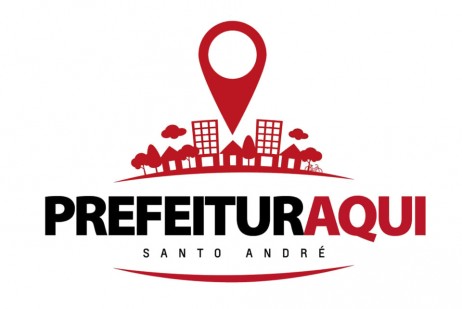 PrefeiturAqui was carried out in each of the 20 districts of the participative budget of Santo André, by a team made up of civil servants from various departments, which acted over a period of 30 days in a specific territory. The actions that were carried out during this period were those of the conservation and improvement of urban space, information on public services and awareness actions to create a caring culture. We call this last aspect the educational action. All the actions are determined in accordance with a prior diagnosis of the region, carried out by the various departments involved in the programme. Organised in this way, the programme provides a series of services to the same territory and at the same time; with a working methodology that also allows the time, and human and financial resources to be perfected and optimised.
PrefeiturAqui was carried out in each of the 20 districts of the participative budget of Santo André, by a team made up of civil servants from various departments, which acted over a period of 30 days in a specific territory. The actions that were carried out during this period were those of the conservation and improvement of urban space, information on public services and awareness actions to create a caring culture. We call this last aspect the educational action. All the actions are determined in accordance with a prior diagnosis of the region, carried out by the various departments involved in the programme. Organised in this way, the programme provides a series of services to the same territory and at the same time; with a working methodology that also allows the time, and human and financial resources to be perfected and optimised.
The educational action of the initiative is divided into two forms:
-the visits, which are carried out during the urban conservation and improvement of the territory, through dialogue with the population and the distribution of training material to the shops and entities and
-the joint education action, an event that gathers together the population of the district on completion of the process with the aim of making visible the changes made in the territory and the training actions carried out as a result of the prior diagnosis.
One of the elements that helps in the mobilization of the educational action is the relation it has with the actions of urban maintenance, such as the pruning of the trees and the cleaning of the irregular points of rubbish dumping. In this sense, at the same time as the accumulated rubbish is removed from these irregular points, the population acquires knowledge about how to ensure that this problem doesn’t happen again. Another important factor is the direct dialogue and the coexistence established with the population by means of the presence of civil servants throughout the time that the programme lasts in the territory.
What is the role of the local health councillors and what benefits does this figure contribute to the local management?
Besides the Municipal Council of Health, Santo André has 54 Local Health Councils, which allow an effective social control, strengthening in this way the democratic participation of the population in the creation and application of public policies.
The councillors are elected by the direct vote of the resident population from the area of action of the health unit, which implies a broad understanding of democratic participation in the decisions of the municipality in all the domains, including health. This dialogue allows municipal decision makers to interact with the real needs of the population of a given territory, thus attending to the aspirations of the local communities and working in a more precise way. The Councils point out possible failures and solutions in the provision of services, provide guidance to the population in terms of the functioning of the services, stimulate organised participation in the territory of the workers and managers of the units, aiming to improve the provided services, within the field of the unit of health and throughout the city.
The city provides a large number of educational opportunities and pedagogical resources. Could you give us some examples of these?
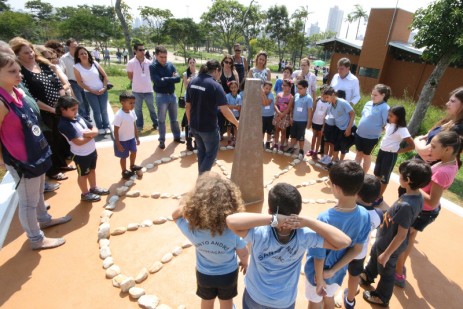 In addition to the pedagogical and technological resources which form part of the wealth of the schools, such as books, games and computers, the Municipal Network of Education counts on an extensive offer in the city, such as SABINA – the Park of Knowledge, the School Park or the CESAS. All of these educational facilities are also open to the population.
In addition to the pedagogical and technological resources which form part of the wealth of the schools, such as books, games and computers, the Municipal Network of Education counts on an extensive offer in the city, such as SABINA – the Park of Knowledge, the School Park or the CESAS. All of these educational facilities are also open to the population.
The SABINA is one of the main centres of interactive sciences of contemporary education of the State of São Paulo, that has the mission of being a major laboratory for the schools in the areas of physics, chemistry and biology. Counting on numerous facilities, experimentation activities and temporary exhibitions, the space also includes a music workshop, a library, an auditorium, and various classrooms.
Among the most valued attractions by the students, there is the dinosaur, the skeleton of the Tyrannosaurus rex, 12.8 metres long —the unique replica in LatinAmerica—, and a Ceratosaurus robot which moves and emits sounds. The group of Magellanic penguins has become an attraction in itself, mainly after receiving, at the end of 2013, the first baby bird born in the SABINA. Another highly appreciated activity is the spaceship simulator, that gives the visitors the feeling of flying over Santo André as far as the São Paulo coastline, ending the “tour” by taking a dive to the bottom of the sea to take a look at the inhabitants of the preserved marine area, known as Laje de Santos. Furthermore, another simulator called Fury of Nature, offers the visitors the chance to contact with phenomena such as hurricanes, volcanoes and earthquakes, by means of a secure mobile platform. The SABINA also has 150 experimentation activities, such as the famous generator of Van De Graaff and the planetarium and digital theatre of Johannes Kepler, the most modern in Brazil.
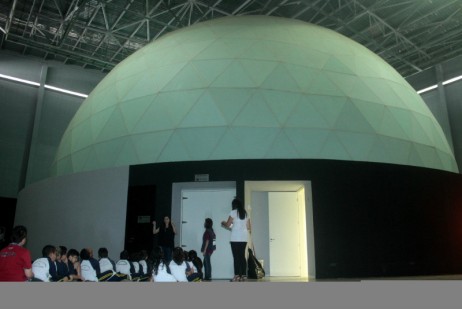 The School Park Project began in 1997, focused on offering an inclusive education that places the emphasis on the environment as one of the main resources in the process of building knowledge. So far, the aim of the project has been to build the awareness of the children, teachers, directors and civil servants from the municipal network in environmental issues and natural sciences, also stimulating the participation of schools, parents and the community. It’s 50,000 m2 provides pedagogical resources for stimulating and awakening the curiosity in environmental topics, botany, art and the recycling of materials, as well as building social awareness through educational practices. A major part of the areas of the School Park were constructed with recycled materials and by getting the most out of the natural resources. The School Park offers courses, in the form of workshops, talks and exhibitions included in its monthly agenda. As well as all of this, it also has spaces for theatre plays, photographic exhibitions, and plastic arts, an open-air gymnasium and a wooded area for taking a walk.
The School Park Project began in 1997, focused on offering an inclusive education that places the emphasis on the environment as one of the main resources in the process of building knowledge. So far, the aim of the project has been to build the awareness of the children, teachers, directors and civil servants from the municipal network in environmental issues and natural sciences, also stimulating the participation of schools, parents and the community. It’s 50,000 m2 provides pedagogical resources for stimulating and awakening the curiosity in environmental topics, botany, art and the recycling of materials, as well as building social awareness through educational practices. A major part of the areas of the School Park were constructed with recycled materials and by getting the most out of the natural resources. The School Park offers courses, in the form of workshops, talks and exhibitions included in its monthly agenda. As well as all of this, it also has spaces for theatre plays, photographic exhibitions, and plastic arts, an open-air gymnasium and a wooded area for taking a walk.
The CESAS are educational complexes that include nursery school, pre-school and primary education, community centre and library. Furthermore, they provide the students, families and the local community with pleasant spaces, with a path for walking, an area of socialization, a swimming pool and a sports complex, where it is possible to carry out sports, cultural and leisure activities.
The City Council of Santo André is responsible for the pre-school and primary or fundamental education. What is the importance of the ongoing training of the professionals from education with regard to the results obtained by the students during this stage?
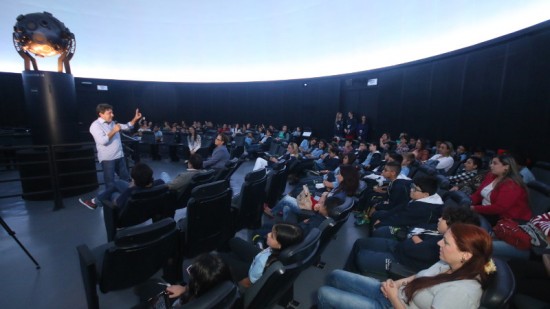 The teacher training is understood by this Government to be an opportunity for skills acquisition that is offered to the educators from the public municipal network so as to increase their professional skills and acquire theoretical contents which allow them to consolidate a liberating and critical education in the practice.
The teacher training is understood by this Government to be an opportunity for skills acquisition that is offered to the educators from the public municipal network so as to increase their professional skills and acquire theoretical contents which allow them to consolidate a liberating and critical education in the practice.
We consider that reflexive teachers, generators of knowledge, improve their teaching skills, by planning and structuring their everyday work so as to make the teaching-learning process of the students more agreeable, aimed at their integral development. By having constant access to historically accumulated knowledge and to the social and scientific advances, the field of teaching performance is extended, thus positively affecting the students’ growth.
This process requires professionals from education to be suitably prepared for working with a profile of students from the 21st century, that is to say, with new needs and that tackle the new social, cultural and affective challenges. These new needs and challenges require teachers to be able to understand, anticipate and act within modern society, educating so that the act of learning is valued. Therefore, keeping up-to-date, in all the fields of human knowledge involving pedagogical action, is essential.
It is in the recognition of the teachers’ work, in professional self-realization, that the teacher is stimulated in the act of teaching, in creating environments in which the students believe in their cognitive and affective skills and abilities, by means of the creation or the application of innovative techniques, sharing knowledge with the students and their families, in an unbroken learning chain.
We can say that the teachers from our Education Network, by having access to high quality ongoing training, have the opportunity to develop themselves personally, to improve their critical capacity and to foster the development of the students. They do so by means of a dialogic process that is based on the understanding of the world, which will allow them to reflect on their reality and act in a committed way in building a different future. In turn, this process stimulates the students’ confidence in their own capacities to create, construct and reconstruct, helping them to plan, based on their skills and abilities, and not only on the acquired knowledge.
The city of Santo André has received around 700 refugees from Haiti. How do you work on the social inclusion of these people?
Since 2013, the City Council of Santo André has acted in a matrix system way, coordinating and interlinking the different services and departments, such as Health, Education, Human Rights, Work and Social Care. The Department of Inclusion and Social Care carries out Portuguese language courses and vocational training, through the national programme of access to technical training and employment (PRONATEC); It also works for the inclusion of the families and the individuals in the programmes of income transfer and special social protection, such as those offered by the Centre of reference specialised in social care (CREAS), in case of violation of rights.
25% of the population of Santo André is young, with a highly diversified population. How do you manage to include the voice of the youth in the design of the government actions aimed at this age group?
We promote actions in public spaces involving children and teenagers, such as, for example: “the Act of childhood and adolescence in the Peace Tower”, in which children attended by the Federation of Healthcare Entities of Santo André (FEASA) participate, with the collaboration of the Santo André Forum of Human Rights and Culture of Peace. This act for fostering a culture of peace in the municipality counts on diverse actions carried out by the users of the social-healthcare entities of the city. It is held on 2nd October, which is the International Day of Non-Violence (for promoting a Culture of Peace) and the birth date of Mahatma Gandhi.
How is the culture of peace fostered in the city?
The Department of Human Rights and Culture of Peace boosts in the city the innovation of a government concerned with the respect of the citizenship and its dignity and ensures the reflection and transformation of the current reality.
Consolidating this Department as well as the reflection, allows us to introduce, in a gradual way actions in various fields of intervention aimed at moving from a violent culture into a culture of peace. Ensuring peace goes far beyond political, economic or military agreements; it depends on unanimous, sincere and ongoing commitment. Involved in the movement for constructing peace, the area of Humanities of this department boosts the wellbeing of the cities and the human development by means of fostering certain individual and collective actions.
The challenge is to provide children and adults with an understanding of the principles and respect for freedom, justice, democracy, human rights, tolerance, equality and solidarity. This implies the clear rejection of any manifestation of violence. The area of Humanities manages the conflicts that take place in the city and promotes ethics as a principle for the restoration of human dignity. The actions are aimed at awakening the expressions of love and respect, which in recent times have been dormant. Since 2013, the agenda has included the Circles for Building Peace, in Institutions CRAS, CIPAS, Universities and other spaces; and the Democratic and Culture Development Project of Coexistence that consists of training multiplying agents by means of the training of popular leaders and citizens. The department carries out specific actions such as: training of leaders in Theater of the Oppressed workshops, talks about human trafficking, women’s circles, male meeting circles, and other activities about Human Rights, always in a transversal way with the Education Department and other departments involved in the issues.
The “elderly” population of Santo André represents 13%, what services does the City Council offer these people?
As well as the policies developed by other departments such as Health and Education, the Department of Inclusion and Social Care offers coexistence spaces, such as the Centre of reference for the elderly of Santo André (CRISA), whose aim is to enable old-aged people to improve their quality of life, increase their self-esteem, strengthen their family and community ties and prevent social isolation, by means of coexistence, leisure, sports and cultural activities, as well as digital inclusion and family integration that provide healthy ageing and the defence of their rights. Around 700 people are attended every week, either in their headquarters or in the 32 groups spread around the city. The construction is being undergone of a Day Centre for the Elderly, which will be a space of coexistence prepared for receiving elderly people throughout the day, offering socio-educational activities but avoiding their institutionalization in order to not deprive them of the daily contact with their families.
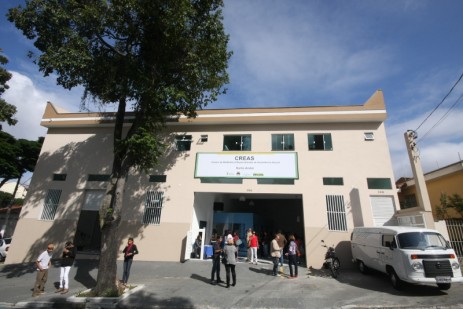 Furthermore, the Centre of reference specialised in social care (CREAS) is responsible for the attention, accompanying and adoption of the necessary measures in case of the violation of the rights of this social group, such as violence against the elderly, abandonment or negligence. In addition to receiving complaints and carrying out appropriate referrals, the technical staff of the CREAS provide guidance about the rights of the elderly, developing preventive actions and coordinating a network of care, which includes the public advocacy and an institutional service for taking in the elderly. The complaints are received either onsite, by telephone or by means of referrals of professionals from other institutions.
Furthermore, the Centre of reference specialised in social care (CREAS) is responsible for the attention, accompanying and adoption of the necessary measures in case of the violation of the rights of this social group, such as violence against the elderly, abandonment or negligence. In addition to receiving complaints and carrying out appropriate referrals, the technical staff of the CREAS provide guidance about the rights of the elderly, developing preventive actions and coordinating a network of care, which includes the public advocacy and an institutional service for taking in the elderly. The complaints are received either onsite, by telephone or by means of referrals of professionals from other institutions.
Photos: Júlio Bastos and Diego Alves (Prefeitura de Santo André)
Por categoria
- Assembleia (25)
- Banco de experiências (21)
- Comissão de Coordenação (2)
- Comité (15)
- Congressos (73)
- Dia Internacional (58)
- Encontro (3)
- Experiência destacada (16)
- Exposição (17)
- Formação (18)
- Out of Category (57)
- Prémio (24)
- Publicações (101)
- Redes (135)
- Videos (6)
